
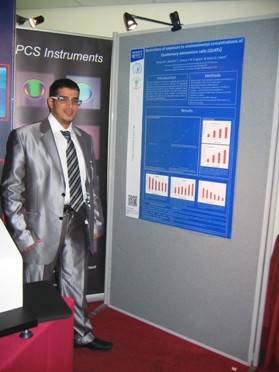
November 2011: PhD student Omar Alharbi presents his work on Biomsrker studies of the corrosion inhibitor, Quaternary Ammonium Salts (QUATS) at the RSC Chemistry in the Oil Industry XII meeting 7th-9th November, 2011, in Manchester
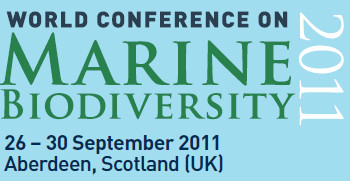
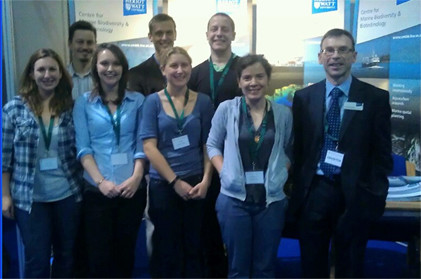
September 2011: Virgnia Echavarri Bravo was part of a large delegation of Heriot-Watt’s Centre for Marine Biodiversity and Biotechnology that attended the World Confrence on Marine Biodiversity in Aberdeen. She presented a digital object of her work on the effects of silver nanoparticles on estuarine microbial communities.

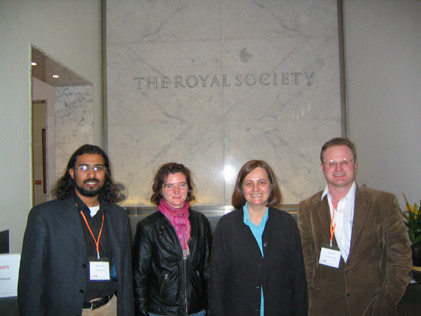
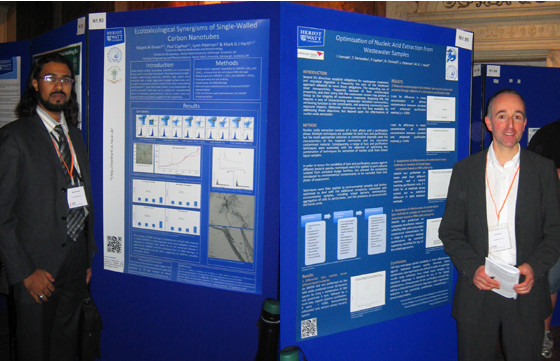
September 2011: Members of the Nanosafety Group attended the 6th International Conference on the Environmental Effects of Nanoparticles and Nanomaterials at the Royal Society in London. Heriot-Watt University was well represented by the group who presented five posters and gave one oral presentation.

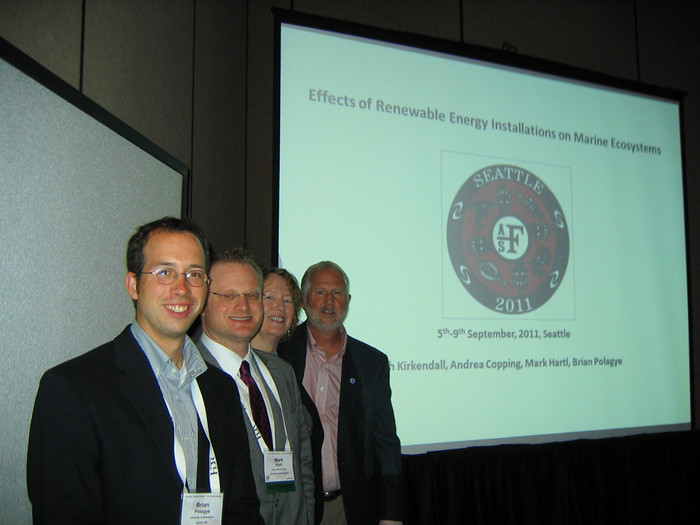
September 2011: The Bioengineering and Physiology Sections of the American Fisheries Society sponsored a joint session on the Effects of Renewable Energy Installations on Marine Ecosystems. Co-organisers (L to R): Brian Polagye, Mark Hartl, Andrea Copping, Keith Kirdendall. The session had 20 talks and attracted 70+ attendees. A list of talks can
be found here.
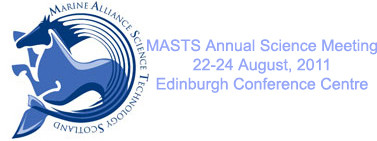
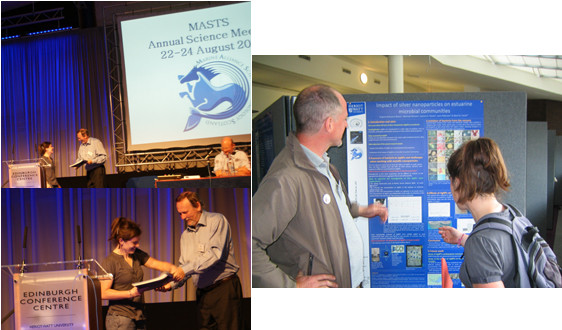
August 2011: Virginia Echavarri Bravo, PhD student in Dr Hartl’s lab, was awarded joint best poster at the MASTS Annual Science Meeting, show-casing her work on the environmental impact of silver nanoparticles on estuarine microbial communities. The prize was presented by Prof Carlo Heip, from the Royal Netherlands Institute for Sea Research, who also chaired the panel judging the posters.
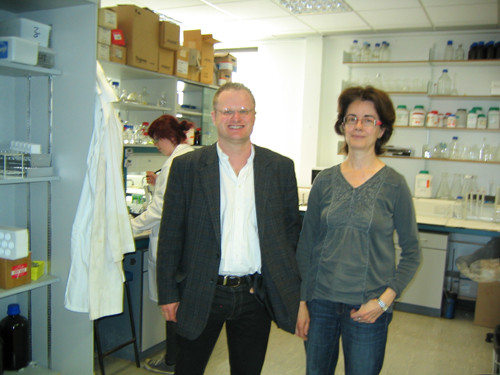
July 2011:Dr Cinta Porte Visa, Chemistry Dept, Institute of Environmental Assessment and Water Research, Spanish Council for Scientific Research, Barcelona, Spain, is currently visiting Dr Hartl’s lab to discuss further research collaboration. [Link to Dr Porte’s research]
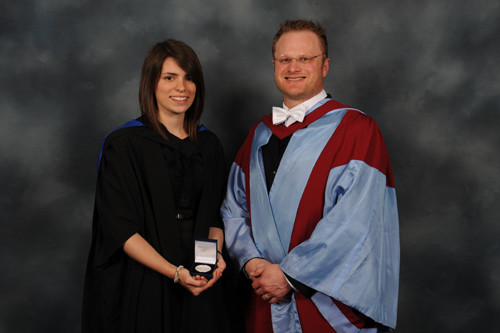
June 2011: Congratulations to Rebecca Grieve, BSc who received the Dr Maia Strachan award for best honours dissertation in Applied Marine Biology! Project title: “An investigation into the effect of the oilfield chemical, Tetradecyl Dimethyl Benzyl Ammonium Chloride (QUAT C14) on several biomarkers of exposure in the blue mussel,Mytilus edulis“, supervised by Dr Mark Hartl


April 2011: Members of Dr Hartl’s group attended the Heriot-Watt Life Sciences Interface Day at the Postgraduate Centre, Edinburgh Campus. We took the opportunity to display recent work on the environmental impact of silver nanoparticles and network with colleagues across the Engineering/
Physics/Life Sciences Interface.

Funding success!
March 2011
FP7-NMP-2011-CSA, NMP.2011.1.3-3. Intelligent testing strategies for nanomaterials impact and exposure – towards regulation and clustering of materials: ITS-NANO – Intelligent testing strategy for engineered nanomaterials. Consortium CSA led by Stefano Pozzi Mucelli (Veneto
Nanotech SCpA). Partners: Heriot-Watt University (Edinburgh), Institute of Occupational Medicine (IOM, Edinburgh), Arhus University (AU, Denmark), Italian Institute of Technology (IIT), Centro Ricerche Fiat S.C.p.A. (CRF, Italy), Fraunhofer (IME, Germany), National Research Centre for
the Working Environment (NRCWE, DK), Joint Research Centre (JRC, Brussels), European Research Services GmbH (ERS, Germany) – currently awaiting commencement of negotiation stage.
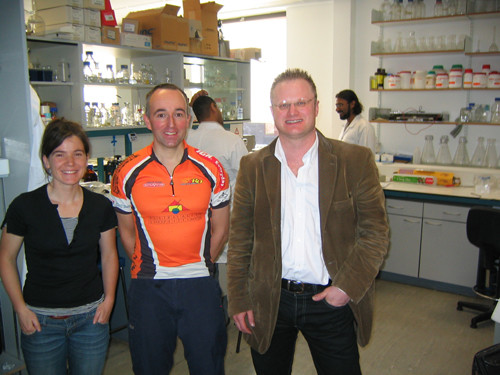
October, 2010: A warm welcome to Virgnia Echavarri Bravo and Iain Hannah, who have recently started PhD projects in Dr Hartl’s lab, researching the impact of silver nanoparticles on microbial
communities in water treatment plants and estuarine environments

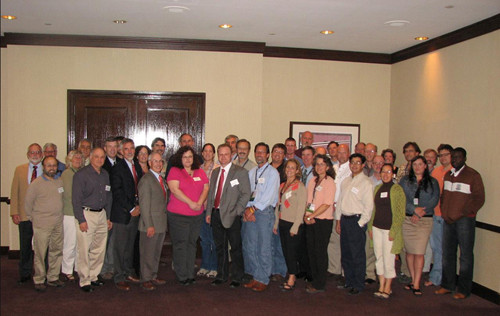
Dr Mark Hartl represented the physiology section of the American Fisheries Society at the AFS Governing Board meeting in Pittsburgh, 11th September, 2010. He took the opportunity to forge links between AFS and the Marine Alliance for Society and Technology Scotland (MASTS), the marine pooling initiative supported by the Scottish Government, and was able to identify a number of areas of potential collaboration, in particular marine renewable energy and deep-water drilling, both very topical issues with potential impacts on fish and fisheries.

PhD student, Omar Alharbi presents our poster to Ambassador Mohammed bin Nwaf at the 4th Saudi International Conference sponsored by Al-Imam Muhammad Ibn Saud Islamic University and hosted by The University of Manchester, UK, 30–31 July, 2010.

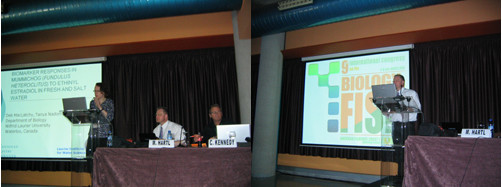
Dr Mark Hartl co-chairs the Toxicology Session at he 9th ICBF, Barcelona, 5-9th July 2010:
Fish in a toxic world: Biomarkers and impacts of exposure
Coordinators: Mark Hartl, Chris Kennedy, Alan Kolok
Aquatic environments offer and sustain diverse habitats for fish, but also attract an ever-increasing level of anthropogenic activity, of both commercial and recreational nature. Consequently these
environments are under continued pressure owing to the discharge of communal and industrial effluent and atmospheric fallout, as well as pesticides from agricultural runoff and antifouling agents.
The input of these often toxic contaminants, as well as re-introduction from secondary sources, such as sediment deposits, has had often subtle, but nonetheless dramatic impacts on fish and fisheries. Understanding the underlying routes of contaminant exposure and mechanisms of toxicity in fish, on all levels of biological organisation, is vital in order to protect vulnerable species that often inhabit key positions in the structure of delicately balanced aquatic communities. As in previous years, this
symposium provides a popular multidisciplinary platform for researchers, particularly graduate students, to present and discuss their work on toxic mechanisms, comparative approaches to toxicology of various
compound groups, including organics and metals, and associated ecotoxicological biomarkers.
Funding success!
16 June, 2010
Dr Mark Hartl (Centre for Marine Biodiversity & Biotechnology) and Prof Teresa Fernandes (Napier Edinburgh University) have been successful in securing £30,000 from Marine Alliance for Science and Technology Scotland (MASTS) towards the cost of a PhD studentship for Iain Hannah, currently
doing an MSc in Marine Resource Development and Protection with Dr Hartl. The project will investig ate the impact of waste-water-derived silver nanoparticles on microbial communities in waste-water
treatment plants.

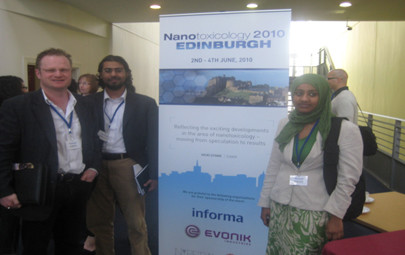
Nanotoxicology 2010, 2-4 June, Edinburgh. Dr Mark Hartl and Postgraduate students Dina Ahmed and Majed Al-shaeri, attended the recent international conference on Nanotoxicology at Napier Edinburgh University. Delegates were offered a diverse range of talks and poster
presentations and were able to mingle with like-minded researchers from all over the world, exchange ideas and make new contacts. The next meeting will combine the hitherto separate Nanotoxicology and NANOTOX meetings and will be held in Beijing in 2012.
Funding success!
18 May, 2010
Dr Mark Hartl (Centre for Marine Biodiversity & Biotechnology) and Dr Lynn Paterson (School of Engineering and Physical Sciences) have been successful in securing £80,000 from Heriot- Watt University Environment and Climate Change Theme. The project will investigate the
impact of waste-water-derived silver nanoparticles on microbial communities in marine and estuarine environments and will employ one PhD student for three years.
